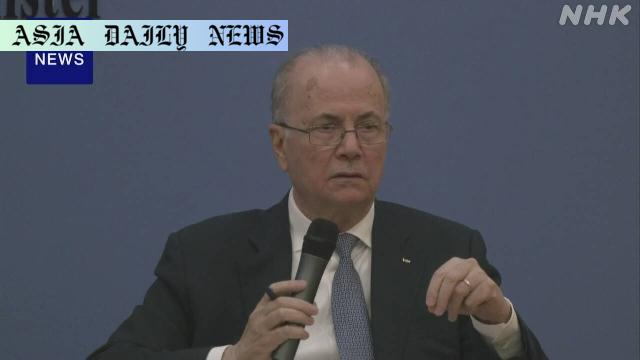Two-State Solution: Palestinian PM Mohammed Mustafa expresses optimism about advancing meaningful dialogue at the UN conference.
- The Palestinian PM hopes for meaningful progress at the UN conference.
- He emphasizes the necessity of recognizing Palestine as a state.
- A ceasefire in Gaza remains a critical objective amid regional tensions.
- The US opposes the conference and pressures others to do the same.
- Integration of Gaza and the West Bank under one Palestinian government is hinted.

Palestinian Optimism Ahead of Crucial UN Conference
The upcoming United Nations conference has sparked hope among Palestinian leadership for the revival of the two-state solution discussions. Palestinian Prime Minister Mohammed Mustafa expressed optimism during his remarks in the West Bank city of Ramallah. He emphasized the necessity of significant, meaningful negotiations to resolve the Israeli-Palestinian conflict. According to Mustafa, this dialogue is crucial not only for the establishment of a Palestinian state but also for achieving lasting peace and security in the region. “Hopefully we can move forward into a serious, meaningful negotiation and dialogue,” he stated, underscoring the importance of global recognition of a Palestinian state as a stepping stone toward stability.
Persistent Challenges in Gaza and Regional Unity
Addressing the persistent and escalating tensions in Gaza, Mustafa stressed the need for an immediate ceasefire, an effort directed towards reducing the humanitarian crisis faced by Palestinians. Highlighting the broader vision, he hinted at integrating Gaza with the West Bank under a unified Palestinian government. This potential unification could pave the way for a cohesive Palestinian state, promoting stronger political and economic stability. However, the challenges posed by ongoing violence and differing political ideologies between factions within Palestine remain significant hurdles that need diplomatic and domestic solutions.
Geopolitical Dynamics: Opposition and Global Diplomacy
Despite the Palestinian leadership’s optimism, the proposed conference has met with strong resistance from Israel and subdued support from global powers. Reports suggest that the United States government has been actively lobbying other nations against participating in the meeting. This opposition underscores the larger geopolitical tensions surrounding the Israeli-Palestinian conflict, where influential powers act based on strategic interests rather than regional peace. The lack of universal participation at this meeting could hinder the progress needed for establishing resolutions that include widespread consensus and cooperative effort.
The Key to Peace: International Collaboration and Dialogue
The Palestinian Prime Minister’s emphasis on dialogue resonates with the broader international community’s aspirations for peace in the Middle East. A two-state solution has long been viewed as a viable path to ensuring coexistence, stability, and security for both Israel and Palestine. Recognizing Palestine as a sovereign entity, however, remains a contentious issue in global politics. This recognition is not merely symbolic but represents a commitment to peace and justice. If achieved, it could serve as a foundation for ensuring equitable resource distribution, resolving territorial disputes, and fostering harmonious relationships between neighboring states.
The Road Ahead: Challenges and Opportunities
While the upcoming conference provides a platform for renewed dialogue and potential agreements, the road ahead remains fraught with challenges. Achieving sustainable peace requires not only international cooperation but internal consensus among Palestinians and a willingness from Israel to engage in transparent negotiations. The integration of Gaza, improvement of living conditions, and addressing historical grievances will be critical elements for long-term success. Without collective willpower from all stakeholders, the vision of a two-state solution may continue to face obstacles. Nevertheless, continued efforts to engage global powers in meaningful conversations could gradually turn aspirations into reality.



Commentary
The Importance of Reviving the Two-State Solution
The two-state solution remains one of the most debated yet essential frameworks for resolving the Israeli-Palestinian conflict. As leaders on both sides grapple with historic grievances, territorial disputes, and political differences, a renewed focus on diplomacy is urgently needed. The international community also bears the responsibility of facilitating peaceful dialogues, prioritizing human rights, and addressing the root causes of unrest in the region. The upcoming UN conference could represent a turning point if approached with sincerity and commitment by all involved parties.
The Human Cost of Inaction
One cannot underestimate the human cost of failing to resolve the Israeli-Palestinian conflict. From recurring violence in Gaza to the deterioration of living standards for millions of civilians, inaction perpetuates suffering. For both Israel and Palestine, achieving peace is no longer just a political imperative but a humanitarian necessity. Addressing immediate issues like ceasefires and human aid, as outlined by the Palestinian PM, is essential to laying the groundwork for broader solutions.
Global Cooperation: A Critical Need
The disconcerting reports of the US lobbying against the upcoming conference highlight the complexities of geopolitics influencing the peace process. International unity is crucial in achieving viable resolutions. The unwillingness of key global players to participate or support such initiatives undermines the prospects of peace. It is imperative for influential nations to consider long-term stability rather than short-term strategic interests when engaging in the region’s affairs. True peace will only arise when global efforts are aligned to promote fairness, justice, and mutual respect.